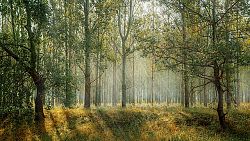

The Secretary of State for the environment, George Eustice has outlined a series of plans to protect and restore the UK's nature, address the climate and biodiversity crisis, and also help to deliver net-zero carbon emissions by 2050. The announcement also sets out plans to treble the rate of tree planting in England.
In his speech, the Secretary of State said: "We will be amending the Environment Bill to require an additional legally binding target for species for 2030, aiming to halt the decline of nature.
"This is a huge step forward, and a world leading measure in the year of COP15 and COP26 as we build back greener from the pandemic. We hope that this will be the Net Zero equivalent for nature, spurring action of the scale required to address the biodiversity crisis."
The Government also announced £500m to fund increased tree planting in England, to reach 7,000 hectares a year of future forests planted by 2024, and provide a new target for wildlife populations, including efforts to reintroduce species long lost to England, such as beavers and wildcats.
Additionally, the Government will ban the sale of peat products, such as peat soil for planting from 2024, extraction of which was found to be damaging the UK environment and contribute to increased carbon emissions, subject to public consultation later this year. Ministers will also provide £50m to support the restoration of 35,000 hectares of peatland by 2025.
A study commissioned by the Natural history Museum and RSPB found that the UK is currently placed in the lowest 12% of global countries and territories for biodiversity intactness, and England scored 7 out of 240 for biodiversity intactness, where 1 is the lowest score possible. In comparison, Japan's score is 85, while Canada, one of the countries with the most preserved biodiversity, scored 232.
The chief executive of Wildlife Trusts, Craig Bennett, said: "Today we face a twin nature and climate emergency – these crises are entirely interlinked and one cannot be tackled without addressing the other. It's essential that we stop nature's decline and restore 30% of land and sea by 2030 – doing so will help wildlife fight back and enable repaired habitats to store carbon once more.
"Vast, landscape-scale restoration projects need funding by Government to help us reach this target because, at the moment, only 10% of our land is protected for nature and only half of this is in a good state. Nature Recovery Networks need to be at the heart of our future planning system so that our new nature places are carefully mapped out, joined up and put where they will work best for nature and people."